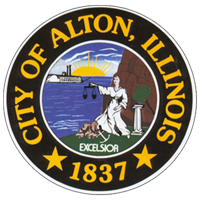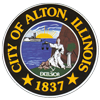Freedom of Information Act Info (FOIA)
Click here for the City of Alton Freedom of Information Act Request Form
Click here for the Police Department Freedom of Information Act Request Form
What is FOIA?
The Freedom of Information Act (FOIA) is a state statute that provides the public the right to access government documents and records. The premise behind FOIA is that the public has a right to know what the government is doing. The law provides that a person can ask a public body for a copy of its records on a specific subject and the public body must provide those records unless there is an exemption in the statute that protects those records from disclosure.
Who can file a FOIA request?
Anyone. Any person, group, association, corporation, firm, partnership, or organization has the right to file a FOIA request to any state or local public body, including any city, township, or county office.
How many days does the public body have to respond to my FOIA request?
A public body must respond to a FOIA request within 5 business days after the public body receives the request. Day 1 of the 5-day timeline is the first business day after the request is received by the public body. The date that the request was received by the public body does not count as “Day 1.” That time period may be extended for an additional 5 business days from the date of the original due date if:
- The requested information is stored at a different location;
- The request requires the collection of a substantial number of documents;
- The request requires an extensive search;
- The requested records have not been located and require additional effort to find;
- The requested records need to be reviewed by staff who can determine whether they are exempt from FOIA;
- The requested records cannot be produced without unduly burdening the public body or interfering with its operations; or
- The request requires the public body to consult with another public body who has a substantial interest in the subject matter of the request.
If additional time is needed, the public body must notify the requester in writing within 5 business days after the receipt of the request of the statutory reasons for the extension and when the requested information will be produced.
How to make a FOIA Request?
If you would like to obtain information from a public body, you should begin by writing down a list of the information you are seeking. Then prepare a letter to that public body’s office. If you are not sure to whom to address the letter, contact the public body’s main office and request the contact information for the FOIA officer. Your letter should include your name, your address, the date, and a daytime phone number so that the public body can contact you if they have any questions. Describe the information you are seeking with sufficient detail so that the public body can find the requested records.
Providing as much information as possible in your request on the subject matter may expedite the public body’s search process. You do not need to describe the document specifically and accurately by the same name the public body uses. As long as the public body understands what is being requested, they must release that information, even if the requester does not call it by the same name the public body uses. Public bodies cannot require that the public submit FOIA requests on a specific form or in a specific format. Public bodies, however, can require that FOIA requests be submitted in writing. Public bodies must accept requests by mail, personal delivery, fax, e-mail, or other means available to the public body. Public bodies may accept oral FOIA requests but are not required to do so.
What is considered a “public record”?
“Public records” are defined in FOIA as “all records, reports, forms, writings, letters, memoranda, books, papers, maps, photographs, microfilms, cards, tapes, recordings, electronic data processing records, electronic communications, recorded information and all other documentary materials pertaining to the transaction of public business, regardless of physical form or characteristics, having been prepared by or for, or having been or being used by, received by, in the possession of, or under the control of any public body.” (5 ILCS 140/2(c)) Given this broad definition, FOIA is intended to cover any document, regardless of form, that pertains to government business.
What kind of information can I not get access to?
The FOIA law has a presumption that all information is public unless the public body proves otherwise. There are several exceptions to public disclosure that include but are not limited to:
- Private information, which is defined as “unique identifiers, including a person’s social security number, driver’s license number, employee identification number, biometric identifiers, personal financial information, passwords or other access codes, medical records, home or personal telephone numbers, and personal e-mail addresses.” Under FOIA, “private information also includes home addresses and personal license plate numbers, except as otherwise provided by law or when compiled without possibility of attribution to any person.”
- Personal information that, if disclosed, would constitute a clearly unwarranted invasion of personal privacy, unless the disclosure is consented to in writing by the person who is the subject of the information. Under FOIA, the “unwarranted invasion of personal privacy” means the “disclosure of information that is highly personal or objectionable to a reasonable person and in which the subject’s right to privacy outweighs any legitimate public interest in obtaining the information.” Disclosing information that relates to the public duties of public employees is not considered an invasion of personal privacy.
- Law enforcement records that, if disclosed, would interfere with a pending or reasonably contemplated proceeding or that would disclose the identity of a confidential source.
- Information that, if disclosed, might endanger anyone’s life or physical safety.
- Preliminary drafts or notes in which opinions are expressed or policies are formulated, unless the record is publicly cited and identified by the head of the public body.
- Business trade secrets or commercial or financial information that is proprietary, privileged, or confidential and disclosure would cause competitive harm to the person or business.
- Proposals and bids for any contract, until a final selection, is made.
- Requests that are “unduly burdensome.”
Fees
When a person requests a copy of a record maintained in an electronic format, the City shall furnish it in the electronic format specified by the requester, if feasible. The City shall charge the requester for the actual cost of purchasing the recording medium, whether disc, diskette, tape, or another medium.
The City shall charge fees reasonably calculated to reimburse its actual cost for reproducing and certifying public records and for the use, by any person, of the equipment of the City to copy records. No fees shall be charged for the first fifty (50) pages of black and white, letter or legal size copies requested by a requester. The fee for black and white, letter or legal size copies after the first fifty (50) pages shall be fifteen cents ($0.l5) per page. If the City provides copies in color or in a size other than letter or legal, the City shall charge its actual cost for reproducing the records. In calculating its actual cost for reproducing records or for the use of the equipment of the City to reproduce records, the City shall not include the cost of any search for and review of the records or other personnel costs associated with reproducing the records, unless allowed by State law. As such fees are determined, they shall be imposed according to a standard scale applicable to any requester. The fees as they are established shall be made public by the Freedom of Information Officer of the City.
For commercial requests, as defined by the Illinois Freedom of Information Act, the City shall charge ten dollars ($10) for each hour spent by personnel in search for and retrieving a requested record or examining the record for necessary redactions. No fee shall be charged for the first eight (8) hours spent by personnel in searching for or retrieving the requested record. The City may charge the actual cost of retrieving and transporting public records from an off-site storage facility when the public records are maintained by a third-party storage company under contract with the City. The City shall provide the requester with an accounting of all fees, costs, and personnel hours in connection with the request.
If a voluminous request, as defined by the Illinois Freedom of Information Act, is for electronic records and those records are not in a portable document format (PDF), the City shall charge twenty dollars ($20) for not more than two (2) megabytes of data, forty dollars ($40) for more than two (2) but not more than four (4) megabytes of data, and one hundred dollars ($100) for more than four (4) megabytes of data. If a voluminous request is for electronic records and those records are in a portable document format, the City shall charge twenty dollars ($20) for not more than eighty (80) megabytes of data, forty dollars ($40) for more than eighty (80) megabytes but not more than one hundred sixty (160) megabytes of data, and one hundred dollars ($100) for more than one hundred sixty (160) megabytes of data. If the responsive electronic records are in both a portable document format and not in a portable document format, the City may separate the fees and charge the requester under both fee scales. The City shall provide the requester with an accounting of all fees, costs, and personnel hours in connection with the request for public records.
If a requester does not pay a fee charged for a voluminous request, as defined by the Illinois Freedom of Information Act, the debt shall be considered a debt due and owing to the City and may be collected in accordance with applicable law. This fee may be charged by the City even if the requester fails to accept or collect records the City has prepared in response to a voluminous request.
The cost for certifying a record shall be $1.00 per certification sheet.
Contact Us
KARYN CLANTON
Secretary/City of Alton Freedom of Information Officer
E: kclanton@cityofaltonil.gov
BIANCA JACKSON
City Council Coordinator
E: bjackson@cityofaltonil.gov
MAYOR’S OFFICE
101 E. Third Street
Alton, IL 62002
P: 618.463.3500
FAX: 618.463.3525
OFFICE HOURS
Monday – Friday
8:00 A.M. – 5:00 P.M.
LT. MIKE O’NEILL
Alton Police Freedom of Information Officer
E: moneill@cityofaltonil.gov
ALTON POLICE DEPARTMENT
1700 E. Broadway
Alton, IL 62002
PH: 618.463.3505 ext. 624
FAX: 618.462.3797
OFFICE HOURS
Monday – Friday
8:00 A.M. – 5:00 P.M

